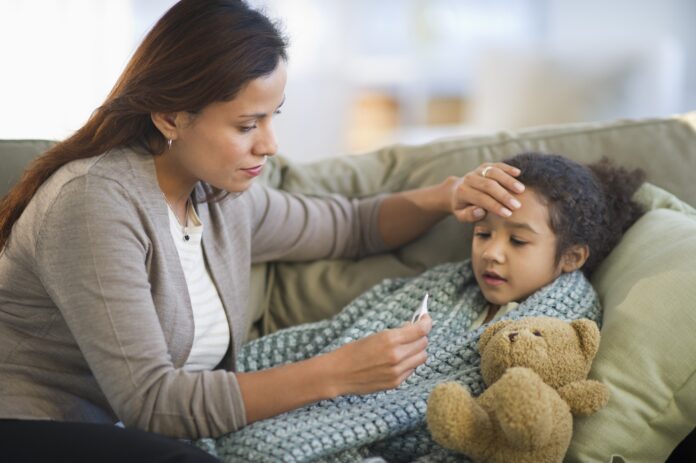Back-to-school time means your kids may soon be coming home with sniffles, sneezes or other infectious symptoms from being in close proximity with other kids. After all, classrooms are perfect spaces for bacteria and viruses to spread between students.
Healthy Habits That Keep Kids Safe
Kids will likely be exposed to colds, pink eye, influenza, stomach viruses, COVID-19, and more. So, what more can you do? Here are a few ideas:
- Encourage good hygiene. Good handwashing is one of the best ways to keep your kids healthy at home and at school. They should wash for at least 20 seconds with soap and water, or they can use an alcohol-based hand sanitizer if there is no visible dirt. Also, make sure your child knows to always cough or sneeze into an elbow to prevent spreading germs to others.
- Maintain a good sleep schedule. Children and adolescents who don’t get enough sleep are at higher risk for many health issues, including an immune system that doesn’t function at its optimal level. Ensuring they get the right amount and quality of sleep will help their bodies to operate at their best. As an added bonus, it will also help their focus and overall academic performance.
- Masking. The CDC recommends parents consider having their child over the age of 2 wear a mask for extra protection, regardless of their vaccination status. Masking helps decrease the spread of COVID-19, influenza and some other respiratory viruses in crowded indoor spaces. The CDC has recommended that schools base their masking guidance on local COVID-19 hospital admissions levels.
- Make sure your child is up to date on vaccines. The CDC recommends all children and adolescents follow its vaccination schedule to help prevent serious illnesses, such as influenza (flu), meningococcal disease, varicella (chickenpox) and whooping cough (pertussis). Additionally, see the COVID-19 vaccine recommendations for everyone older than 6 months.
- Stay hydrated. Hydration is important. Since bacteria and viruses can be found on drinking fountains, teach your child to let the water run before drinking and to avoid touching the fountain with their mouth. You can also send them to school with a water bottle in their backpack (as long as they understand it shouldn’t be shared).
Allergy Alert
Here in Atlanta, ragweed pollen blooms in August and is at its peak in September. In addition to ragweed, tree pollens can also be blamed for allergies. If your child suffers from allergies, talk to their pediatrician about whether allergy medication can help.
Allergy symptoms include:
- Congestion
- Coughing
- Fatigue
- Itchy eyes, nose, and scratchy throat
- Headache
- Sneezing
Learn Where To Go When It’s Not Life-Threatening
If your child comes down with a back-to-school infection, start by seeing your pediatrician, family doctor or primary care physician (PCP). These medical professionals are already familiar with your child’s health history. If you can’t get an appointment at a time that works for you or your doctor’s schedule is booked up, don’t stress. You have options:
- MinuteClinics are a good alternative if you need to see a health care provider sooner than you can see your PCP, or if you need care outside of your PCP’s normal office hours. MinuteClinics can treat many minor illnesses and injuries, and prescribe medications.
- Urgent care centers can also treat serious, but not life-threatening, illnesses or injuries — and they are open at times your PCP is not.
Know Where (and When) To Get Emergency Care
Unfortunately, playground accidents and back-to-school injuries can happen. In addition to bumps and bruises, your child might show signs of an urgent condition. Go to the nearest Emergency Room if your child experiences:
- Blood in the mouth when coughing or vomiting
- Broken bones
- Chest or upper abdominal pain
- Confusion or other changes in mental status
- Difficulty breathing
- Fainting, dizziness, weakness, or trouble moving
- Head or neck injury
- Seizures
- Sudden changes in vision
- Sudden or severe pain
- Severe or persistent diarrhea or vomiting
- Suicidal or homicidal feelings
- Uncontrollable bleeding
If you take your child to the ER, have key information ready for the nurse or doctor. Keep track of when symptoms started, how they progressed and how long they’ve lasted. It’s also helpful to bring a list of any medications your child has taken.
About Emory Healthcare
Emory Healthcare, we’re here to help you find the care you need when you need it. With more than 3,450 physicians in over 70 specialties, 425 locations and 11 hospitals, as well as primary care offices, urgent cares, and MinuteClinics, we’re delivering specialized care across the region. Find a doctor near you to help you get and stay healthy.
If you’re not sure if a trip to the ER is needed, call your family doctor or HealthConnection at 404-778-7777 and speak to an Emory nurse for assistance.
To make an appointment with an Emory primary care provider, click the link below. Patients are now able to schedule appointments online, with some same-day and next-day access available.



